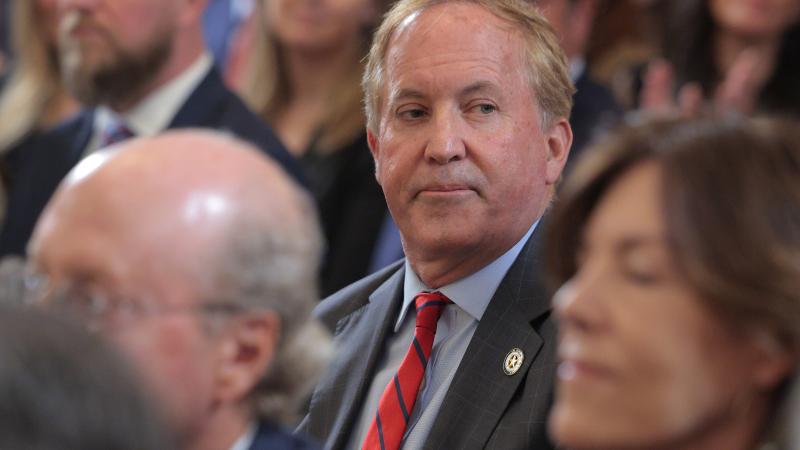Research supporting Biden's pause on LNG has parallels to study supporting the gas stove ban
The proposed ban on gas stoves followed a similar pattern in which research was produced by anti-fossil fuel activists and then repeated by other activists and the media, which then led to a policy -- later walked back by the White House after public outcry.
President Joe Biden has scored huge points with climate activists over his decision to pause export permits for liquified natural gas (LNG).
Despite natural gas playing a key role in reducing carbon dioxide emissions, activists are citing research they claim disputes that natural gas will do anything but exacerbate what they claim is a climate crisis.
The proposed ban on gas stoves followed a similar pattern in which research was produced by anti-fossil fuel activists and then unquestioningly repeated by other activists and the media, which then led to policy proposals.
From study to policy
A little over a year ago, U.S. Consumer Product Safety Commissioner Richard Trumka Jr. was interviewed by Bloomberg News for an article that cited a study linking gas stove use to childhood respiratory problems.
In the interview, Trumka suggested that a ban on gas stoves was an option “on the table,” which set off a national debate about a gas stove ban. Within a couple days, Trumka walked back his comments, and multiple legacy media outlets and left-leaning "fact-check" websites assured readers that the federal government had no plans to ban gas stoves.
Then in February, the Department of Energy released efficiency standards for home appliances, which critics argue effectively bans on gas stoves.
The study was produced by Rocky Mountain Institute (RMI), which promotes the wind and solar industry as a means to eliminate fossil fuels. The nonprofit had nearly $117 million in revenues, according to their 2022 tax filings, and the group enjoys large million-dollar donations, such as a $10 million gift in 2020 from Amazon billionaire Jeff Bezos’ foundation, the Bezos Earth Fund.
Critics of RMI’s gas stove study argue that the quality of the data it used was poor, because it didn’t factor in findings of a 2013 by the International Study of Asthma and Allergies (ISAA), which is considered the most comprehensive global study on the topic to date.
The ISAA study concluded there is “no evidence of an association between the use of gas as a cooking fuel and either asthma symptoms or asthma diagnosis.” Despite the criticism of the RMI study, states like New York are pursuing bans on natural gas hookups in new construction as a health measure.
“There is no question that millions of dollars are poured into academia to produce slanted studies to agree with the funders green agenda. This ’science for sale’ approach not only produces terrible government policy, it also erodes public trust in science, something that academics constantly decry,” Larry Behrens, communications director for Power The Future, a nonprofit that advocates for American energy workers, told Just The News.
LNG research
Activists and Democrats have been pushing the Biden administration for months to put the brakes on its permitting of LNG exports, citing research by Dr. Robert Howarth of Cornell.
The study, which hasn’t been published and is currently going through the peer-review process, finds that total greenhouse gas emissions from LNG are 27% to 200% greater than that from domestically produced coal.
Steve Everly, senior managing director at the public relations firm FTI Consulting, explained in a thread on X that the study was cited in an October article in the New Yorker by climate activist Bill McKibben. A few days after McKibben’s article came out, a group of Senate Democrats wrote a letter opposed to LNG exports, citing Howarth’s research.
A couple months later, the New York Times also cited Howarth’s research in an article about one of the planned LNG export terminals, headlining it “Biden’s next big climate test.”
Dr. Roger Pielke Jr., professor of environmental studies at the University of Colorado at Boulder, explained in an article critical of Biden’s LNG pause, which he posted on his “The Honest Broker” Substack, that Howarth’s study is contrary to a broad scientific consensus that a switch from natural gas to coal lowered greenhouse gas emissions. Pielke called Howarth’s study “a lone outlier.”
Jon Entine, senior research fellow at the Center for Health & Risk Communication at George Mason University claimed in a 2012 op-ed in the New York Post that Howarth had told Etine that his research into fracking is designed to further anti-fossil fuel activism. Hydraulic fracturing, also known as fracking, gave birth to the Shale Revolution, and unleashed large amounts of natural gas from American producers.
Howarth, according to Entine, met with an environmental nonprofit in New York and agreed to produce a study that would dispute that shale gas is comparatively clean.
Howarth told Just The News that he never said any of the things that Entine claims.
Everly says in his thread on X that multiple academics have panned Howarth’s research, calling it biased, containing a “severe methodological flaw,” and being based on “extremely weak data.”
“For decades we’ve witnessed an avalanche of false climate predictions from the ‘follow the science’ community to the point where many are no different from failed doomsday cults,” Behrens said.
Howarth responds
Howarth said that his critics of his recent study comparing emissions from coal and LNG are wrong.
“My analysis was quite conservative in its assumptions. The conclusions are robust and I am sure will stand up to close scrutiny by other experts,” he said.
Howarth also disputed the claim that he’s biased. “I am an academic scientist who is widely respected for my objectivity,” Howarth said. Howarth added that Everley "is not a scientist. He is a lobbyist who represents the oil and gas industry."
He added that there are few other papers published in the peer-reviewed literature on greenhouse gas emissions from LNG, and none that look specifically at LNG export from the U.S., which has only been allowed since 2016.
“When one considers that it takes a lot of energy to liquefy LNG from gas, a lot of energy to transport LNG by tanker, and a lot of energy to heat the LNG back up at the destination port to produce gas again, it should come as no surprise that LNG has a large greenhouse gas footprint. In fact, it would be absurd to think otherwise,” he explained.
He added that the paper the academics criticized has been cited thousands of times in other studies.
Energy crisis
While there is a debate over how much natural gas lowers emissions compared to coal, critics of Biden’s pause on LNG export permits argue it will cause more harm than just increasing emissions.
Following the invasion of Ukraine, which cut off supplies of natural gas from Russia, Western Europe was largely saved from a serious energy crisis as a result of LNG exports, mainly from the U.S.
Citing research by Rystad Energy, Pielke explains that the European gap between contracted and needed supplies of LNG grows larger over the next 16 years. According to Rystad, the U.S. is well positioned to close that gap, provided that export terminal capacity exists to send the supplies.
Pielke argues that climate activists and the Biden administration have this “fantasy” that, if they can deprive Europe of America’s natural gas, Europe will turn to wind and solar.
“If wind and solar could replace LNG imports, then they already would without the U.S. limiting its exports. The reason that countries increasingly rely on LNG is because it is more reliable, more secure, and more economic than the current alternatives,” Pielke wrote.
The plan will also run into what Pielke calls the “iron law of climate policy.” People will object, according to this law, to policies that require them to pay higher prices for energy. So, climate policies that raise energy costs will not have the political support of voters and will become unworkable.
Ultimately, Pielke wrote, Europe will just source LNG from other gas-producing countries, such as Iran or Qatar, and if that doesn’t meet demand, they may warm up again to supplies from Russia.
It’s a point made by more than two dozen Republican senators in a letter Friday to Biden and Energy Secretary Jennifer Granholm.
"Without U.S. LNG exports, European leaders would have to decide between depriving their own citizens of energy or actively funding Russia’s war on Ukraine,” the senators warned, adding that the conflicts in the Middle East will have a much bigger impact without U.S. LNG supplies, which can reach Europe without going through the Red Sea where the Houthis are attacking oil takers.
The pause is expected to last months and won’t likely be lifted before the 2024 presidential election. Anti-fossil fuel activist McKibben warned in an op-ed in the New York Times that the Biden administration will lose their support should they fail to stay the course on what McKibben considers a major victory.
“I have a beer in my hand. If the administration backtracks, it will be a disappointment of epic proportion that I can’t imagine them doing it,” McKibben wrote.
The Facts Inside Our Reporter's Notebook
Links
- scored huge points with climate activists
- decision to pause export permits for liquified natural gas
- key role in reducing carbon dioxide emissions
- citing research they claim disputes that natural gas
- Tumka Jr. was interviewed by Bloomberg
- Trumka walked back his comments
- multiple legacy media outlets
- left-leaning fact-check websites
- federal government had no plans to ban gas stoves
- critics argue effectively bans on gas stoves
- according to their 2022 tax filings
- such as a $10 million gift in 2020 from Amazon billionaire Jeff Bezos
- Bezos Earth Fund
- 2013 by the International Study of Asthma and Allergies
- considered the most comprehensive global study on the topic to date
- New York are pursuing bans on natural gas hookup
- Power The Future
- finds that total greenhouse gas emissions
- senior managing director at the public relations firm FTI Consulting
- explained in a thread on X
- cited in an October article in the New Yorker
- group of Senate Democrats wrote a letter
- New York Times cited Howarthâs research
- broad scientific consensus
- notes in his thread on X
- Western Europe was largely saved from a serious energy crisis
- Rystad Energy
- According to Rystad
- iron law of climate policy
- two dozen Republican senators
- Red Sea where the Houthis are attacking oil takers
- warned in an op-ed in the New York Times
















